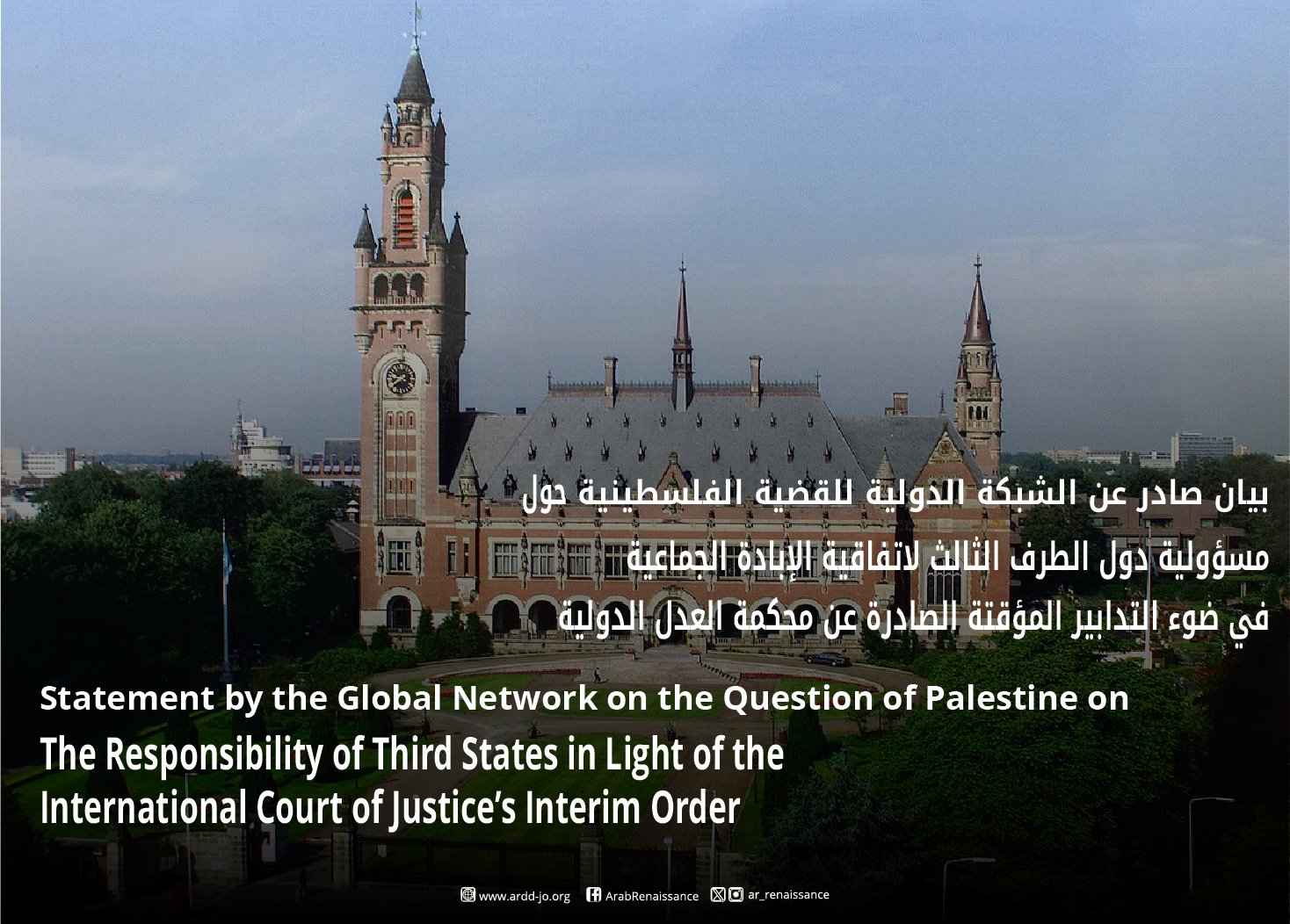The Global Network on the Question of Palestine (GNQP) welcomes the International Court of Justice’s interim order in response to South Africa’s application instituting proceedings against Israel alleging violations of the Genocide Convention for its actions in the Gaza Strip since 7 October 2023 (South Africa v Israel), issued on 26 January 2024. The judgment recognizes the plausibility that Israel is committing acts that constitute genocide under the Convention (para. 54), and that there exists a real and imminent risk of irreparable harm to the rights protected under the Convention (para. 74).
The provisional measures ordered include: refraining from any further acts that may amount to genocide; preventing and punishing genocidal incitement; allowing humanitarian assistance.; preventing the destruction of and preserving evidence; and submitting a report to the Court within one month detailing steps taken to implement the ruling. These provisional measures are binding upon Israel.
In light of the Court’s recognition of the plausibility of genocide being committed against Palestinians in the Gaza Strip, the urgency of the situation and the real risk of irreparable harm, the GNQP further calls on all states, which have a general obligation to ensure that genocide is not committed, and in particular the 153 states party to the Genocide Convention, to ensure implementation of the provisional measures and abide by their obligations to prevent genocide. In the Bosnia v Serbia case (2007), the same Court held that a “State’s obligation to prevent, and the corresponding duty to act, arise at the instant that the State learns of, or should normally have learned of, the existence of a serious risk that genocide will be committed.” (para. 431) The ICJ’s decision in South Africa v Israel affirms that there exists a serious risk that genocide is being or will be committed.
States’ responsibility to prevent genocide thus begins from the moment the state learns of the risk of genocide being committed. Evidence of genocidal acts and genocidal intent have been documented since October 2023, as South Africa’s case clearly shows and as detailed by several UN, NGO and civil society organizations, and the ICJ order confirms that there is a real and plausible risk.
A state’s responsibility in this regard is “to employ all means reasonably available to them, so as to prevent genocide so far as possible,” (Bosnia v Serbia, para 430) including those “likely to have a deterrent effect on those suspected of preparing genocide, or reasonably suspected of harbouring specific intent (dolus specialis),” (Bosnia v Serbia, para. 431). The Court ruled that states party to the Convention are “under a duty to make such use of these means as the circumstances permit,” (Bosnia v Serbia, para. 431). This has particular implications for the United States as Israel’s major provider of weapons and aid.
States are responsible individually and collectively. The ICJ further recognized in the Bosnia v Serbia case, that though one state’s effort may be insufficient to prevent the commission of genocide, “the combined efforts of several States, each complying with its obligation to prevent” (para 430) may avert the commission of genocide. Furthermore, states may not use the excuse that individual action alone would have failed to prevent the genocide to avoid using the means available to them individually.
Failing to prevent and, on the contrary, providing aid or assistance to Israel may make a state complicit if any of the criminalized acts under the Convention are found to have been committed. Knowledge of genocidal intent is important. While some states had previously stated that South Africa’s case was “baseless”, the ICJ’s ruling puts these states on notice. States cannot now feign ignorance.
The ICJ ruling is also a warning to senior members of complicit governments with respect to their potential individual criminal responsibility. In the 2003 Semanza case at the International Criminal Tribunal for Rwanda (ICTR), complicity in genocide was defined as “all acts of assistance or encouragement that have substantially contributed to, or have had a substantial effect on, the completion of the crime of genocide,” (para. 395). Additionally, complicity only requires the commission of the aforementioned acts (assistance or encouragement) “while knowing that such a person or persons were committing genocide, even though the accused himself did not have the specific intent to destroy, in whole or in part, a national, ethnical, racial or religious group, as such.” (Akayesu case (1998), para. 545) Statements of unconditional support of the Israeli government’s actions, as well as pledging and providing military and financial assistance and equipment to Israel, particularly within the context of the ICJ’s order, may be tantamount to individual complicity in genocide.
In addition to the specific crime of genocide, third-state responsibility is triggered concerning Israel’s violations of the prohibition of committing war crimes, crimes against humanity, and other international crimes. States have the duty to refrain from recognizing the validity of these crimes, and from aiding and assisting Israel. As stated by Judge Higgins in the ICJ’s 2004 Advisory Opinion on the Wall “[t]hat an illegal situation is not to be… assisted by third parties is self-evident,” (para. 38).
In light of this, we urge all states, particularly those party to the Genocide Convention, to intervene immediately to protect the Palestinian people against genocide and other grave crimes, employing all means available that would deter and halt Israel, including:
- Halting the export of arms to Israel;
- Suspending economic, financial and technological assistance to and co-operation with Israel;
- Arresting and trying those accused of committing genocide, incitement to commit genocide, complicity in genocide, and other international crimes, on the basis of universal jurisdiction;
- Ensuring that corporate and business entities and institutions under their jurisdiction are not complicit in aiding or assisting Israel.
We further urge civil society groups to hold to account governments and senior government officials that are suspected of complicity in a failure to prevent genocide, including through the provision of aid and assistance to Israel.


